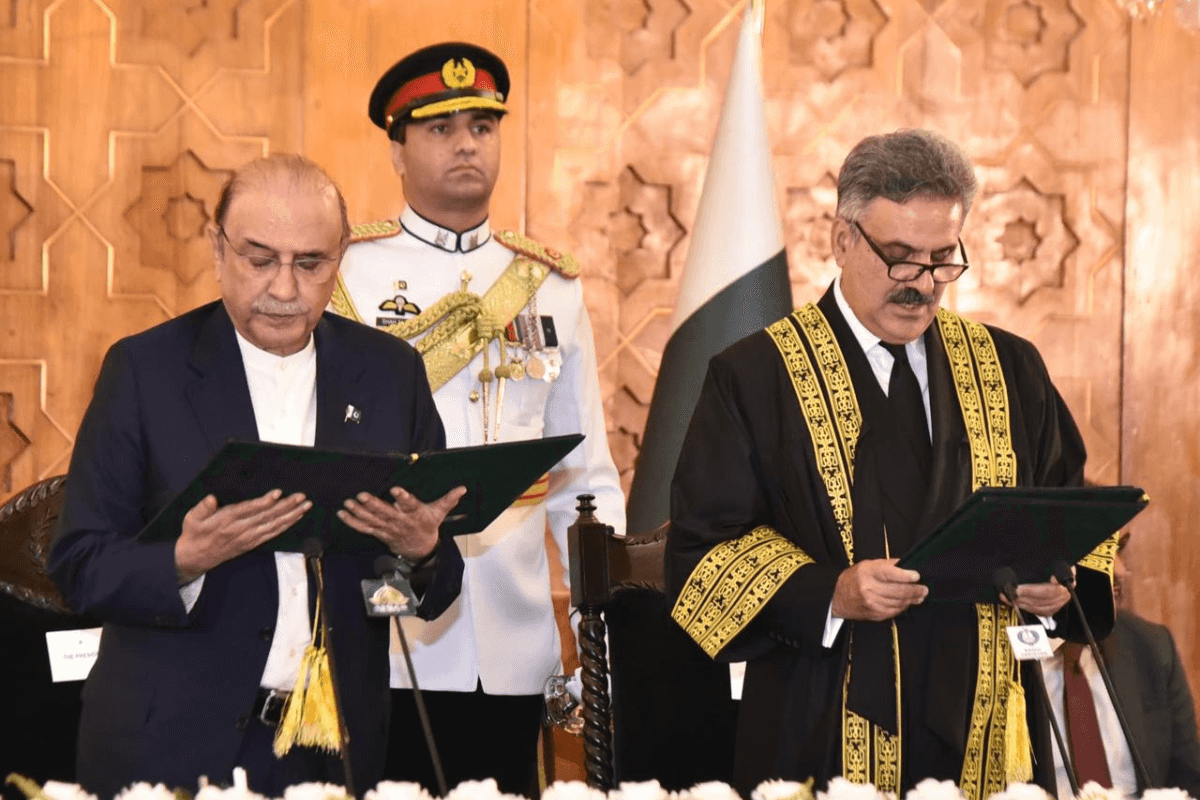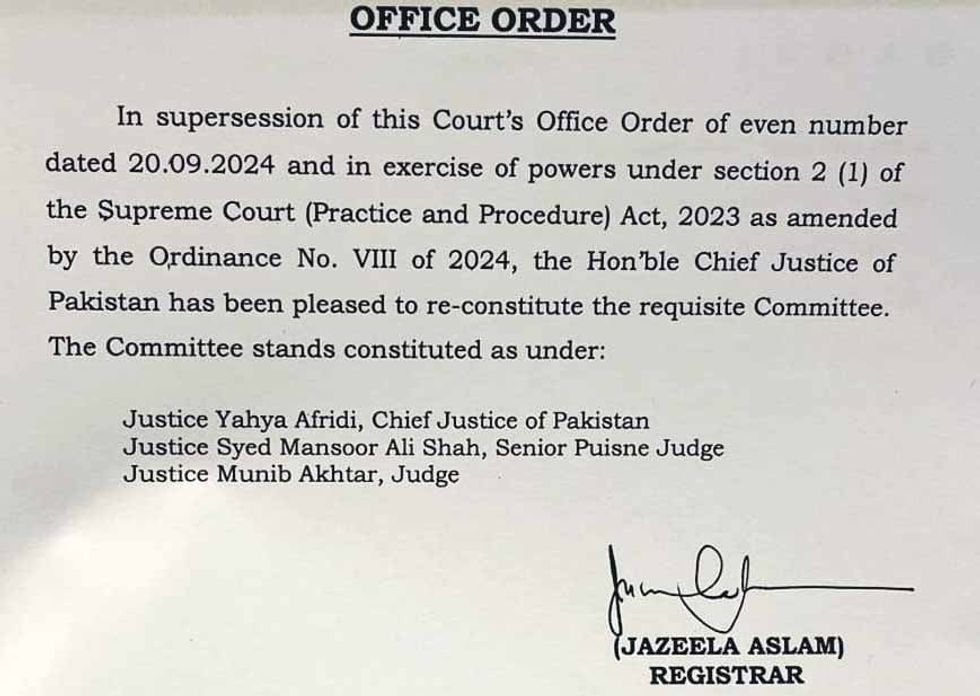New Chief Justice Afridi assumes office, calls full court meeting
President Zardari administers oath to CJP, ceremony attended by top officials.

Javed Hussain
Correspondent
I have almost 20 years of experience in print, radio, and TV media. I started my career with "Daily Jang" after which I got the opportunity to work in FM 103, Radio Pakistan, News One, Ab Tak News, Dawn News TV, Dunya News, 92 News and regional channels Rohi TV, Apna Channel and Sach TV where I worked and gained experience in different areas of all three mediums. My journey from reporting to news anchor in these organisations was excellent. Now, I am working as a correspondent with Nukta in Islamabad, where I get the opportunity of in-depth journalism and storytelling while I am now covering parliamentary affairs, politics, and technology.
News Desk
The News Desk provides timely and factual coverage of national and international events, with an emphasis on accuracy and clarity.

Aamir Abbasi
Editor, Islamabad
Aamir; a journalist with 15 years of experience, working in Newspaper, TV and Digital Media. Worked in Field, covered Big Legal Constitutional and Political Events in Pakistan since 2009 with Pakistan’s Top Media Organizations. Graduate of Quaid I Azam University Islamabad.

President Asif Ali Zardari administering the oath of office to Justice Yahya Afridi as the Chief Justice of Pakistan at an oath-taking ceremony held at Aiwan-e-Sadr, on 26-10-2024.
President House
Shortly after taking his oath, Pakistan’s new Chief Justice Yahya Afridi assumed office and called for a full court meeting on Monday, October 28. The initial session will serve as an introduction, with a second full court meeting planned upon the return of senior puisne judge Syed Mansoor Ali Shah.
In a major administrative move, Chief Justice Afridi also reconstituted the Judges’ Committee for case scheduling and bench formation under the amended Practice and Procedure Act 2023.
The newly formed three-member committee includes Justice Afridi, senior puisne judge Justice Syed Mansoor Ali Shah, and Justice Muneeb Akhtar. This reconstitution reverses former Chief Justice Qazi Faez Isa’s decision to remove Justice Akhtar from the committee, as stated in an office order by the Supreme Court Registrar.

Upon his nomination, Chief Justice Afridi emphasized his commitment to upholding the rule of law and the principles of state sovereignty. "Let me assure all, with the Blessings of Allah Almighty, for the Citizens of Pakistan, Rule of Law shall Rule, Principles of Trichotomy of Power shall prevail and Dignity of a Judge and Majesty of Court shall be strictly ensured” he said.
Justice Yahya Afridi was sworn in as the 30th Chief Justice of Pakistan in a ceremony at the President’s House in Islamabad on Saturday.
President Asif Ali Zardari administered the oath, with Prime Minister Shehbaz Sharif and senior government, military, and judicial officials in attendance.
Justice Afridi became the first CJP nominated by a Special Parliamentary Committee under the newly legislated 26th constitutional amendment. After taking the oath, he arrived at the Supreme Court, where he was presented with a guard of honor before assuming office.
The ceremony was attended by top officials, including Chief Ministers Maryam Nawaz of Punjab and Ali Amin Gandapur of Khyber Pakhtunkhwa, along with Governors Faisal Karim Kundi and Saleem Haider. Supreme Court Justices Ayesha Malik and Athar Minallah also attended, marking a notable presence after both had missed the recent full-court reference honoring outgoing Chief Justice Qazi Faez Isa.
A full-court reference was held on Friday to bid farewell to outgoing Chief Justice of Pakistan (CJP) Qazi Faez Isa. Five senior judges did not attend the reference including Justice Mansoor Ali Shah who was traveling for Umrah.
PTI to join Judicial Commission
Ahead of the oath-taking ceremony for Chief Justice Yahya Afridi, PTI leader and Khyber Pakhtunkhwa Chief Minister Ali Amin Gandapur expressed conditional support for the new Chief Justice, citing an endorsement by Justice Mansoor Ali Shah.
“Justice Yahya Afridi has Justice Mansoor Ali Shah’s recognition as Chief Justice, so we will also accept him. Besides, Afridi is from our province,” Gandapur told Nukta in an exclusive interview.
Asked about PTI’s stance on joining the Judicial Commission under the 26th constitutional amendment, which now includes opposition representation, Gandapur confirmed the party’s intent to participate.
“PTI will definitely attend,” he said, explaining that earlier boycotts of parliamentary committees and decision-making were due to restrictions on meeting with PTI Chairman Imran Khan. “Now that the ban is lifted, we will consult Khan and seek his approval,” he added.
Controversial nomination?
After marathon sessions in the National Assembly and Senate—the upper and lower houses of parliament—the 26th constitutional amendment was finally passed.
The 12-member committee, formed under the recently passed amendment, was tasked with selecting the next Chief Justice from among three senior Supreme Court judges: Mansoor Ali Shah, Munib Akhtar, and Yahya Afridi.
The parliamentary committee had initially adjourned its session to attempt reconciliation with opposition Pakistan Tehreek-e-Insaf (PTI)-affiliated Sunni Ittehad Council (SIC) lawmakers, who boycotted the process.
It reconvened later without the opposition members' participation and proceeded to make its final decision by nominating Justice Yahya Afridi.
Path to the bench
Afridi was born on 23 January 1965 in Dera Ghazi Khan and went to high school at Aitchison College Lahore.
He graduated from Government College, Lahore, and earned a master's degree in economics from Punjab University. Justice Afridi also earned a Master of Laws from Jesus College, Cambridge under a Commonwealth scholarship.
His legal career includes founding the prominent law firm Afridi, Shah & Minallah in 1997.
Early in his career, as assistant advocate general until 1994, Afridi gained prominence for successfully defending the government's position in cases related to the disqualification of alleged drug barons from the 1993 general elections.
During his tenure as Chief Justice of the Peshawar High Court, before his elevation to the Supreme Court in 2018, Afridi presided over several high-profile cases involving terrorism and constitutional matters.







Comments
See what people are discussing